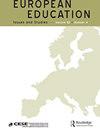The European Comparative Gaze
IF 0.3
Q4 EDUCATION & EDUCATIONAL RESEARCH
引用次数: 1
Abstract
Abstract This paper discusses the comparative perspective of the European Modernity towards other civilizations, and the creation of comparative studies, and, for that matter, of comparative education. The paper argues that much of the debate on Eurocentrism neglects the fact that the European tradition includes also an inextricable self-reflective dimension, which has allowed for the emergence of impartial approaches to the study of overseas societies, and has established critique as a sine qua non intellectual stance. Through illustrations from the cultural history of Europe, the paper points to a rupture in the representational and cognitive closure, that characterized medieval Europe, regarding other cultures, which led to the awareness that, while human beings share the same features societies are instituted differently. However, from the 19th century on, foreign societies were to be gauged primarily through the lenses of “progress” and “development”, which became the main legitimating ideas of capitalist expansion. Nevertheless, as the paper concludes, self-reflectiveness is embedded in the European epistemological tradition – a tradition that needs to be advanced rather than ignored.欧洲人的比较凝视
摘要本文探讨了欧洲现代性对其他文明的比较视角,以及比较研究和比较教育的创立。本文认为,关于欧洲中心主义的许多辩论忽视了这样一个事实,即欧洲传统也包括一个不可分割的自我反思维度,这使得出现了研究海外社会的公正方法,并将批判确立为一种必要的非知识分子立场。通过欧洲文化史的例证,本文指出中世纪欧洲对其他文化的代表性和认知封闭性的断裂,这导致人们意识到,尽管人类具有相同的特征,但社会的建立方式却不同。然而,从19世纪开始,衡量外国社会主要是通过“进步”和“发展”的镜头,这成为资本主义扩张的主要合法理念。然而,正如论文总结的那样,自我反思植根于欧洲认识论传统中——这是一种需要推进而不是忽视的传统。
本文章由计算机程序翻译,如有差异,请以英文原文为准。
求助全文
约1分钟内获得全文
求助全文
来源期刊

European Education
EDUCATION & EDUCATIONAL RESEARCH-
CiteScore
1.20
自引率
0.00%
发文量
5
期刊介绍:
uropean Education is published in association with the Comparative Education Society in Europe (CESE). It is an international peer-reviewed journal devoted to original inquiries and dialogue on education across the member states of the Council of Europe. Established in 1969, the journal features articles on education in individual member states, comparative studies on education across Europe, as well as the impact of European education initiatives globally. The journal especially encourages theoretical and empirical studies, interdisciplinary perspectives, and critical examination of the impact of political, economic, and social forces on education. European Education includes reviews of books and educational films, including those published/produced in English and other languages.
 求助内容:
求助内容: 应助结果提醒方式:
应助结果提醒方式:


